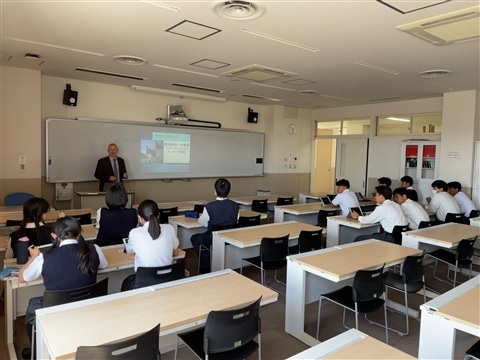- TOP
- Jean Monnet Activities
- Jean Monnet Chair (Agreement No. 2018・3245 / 004 – 001)
- EVENTS Jean Monnet Chair
- 25th May 2023 Lecture at Kwansei Gakuin High school
[ Editor: Institute for Industrial Research 19th Jun, 2023 ]
25th May 2023 Lecture on EU at Kwansei Gakuin Senior High School
Lecture Title:“A Different View on European Integration. Three Stages on the Way of Becoming a Normative (Soft) Power”
Date & Time: 25th May, 2023 1:20 p.m. – 3:00 p.m.
Place: Kwansei Gakuin Senior High School
Lecturer: Holger Bungsche, Professor, School of International Studies, KGU
Number of participants: 12
Purpose:
The purpose of the lecture was to show the students how Europe has gradually developed from a war-destroyed continent to a normative (soft) world power. Against the background of recent rapprochement steps between Japan and South Korea the lecture intended to show the students, what middle powers like Japan and South Korea can achieve, if they cooperate for a prosperous regional economic development based on the commonly shared norms and values like democracy, freedom, human rights, and rule of law.
Description:
The lecture was based and roughly followed the chapter of the book “Introduction to International Studies”, which I contributed in order to provide first grade students an easy-to-understand introduction into the subject of international studies at our university department.
The chapter divides European Integration roughly into three steps.
The first covers the immediate period after the war until mid 1950s when fundamentally necessary institutions, namely the OEEC (Organization of European Economic Cooperation), the EPU (European Payment Union), and the ECSC (European Coal and Steel Community) were established in order to facilitate trade, revive formerly existing structures of division of labour across European countries and establish an institutionalized framework that provided security and stability.
In the second phase of integration the focus was on establishing economies of scale, creating a common internal market, and pursuing first common policies. In this second stage, which roughly covers the time from the end of the 1950s to the end of the 1980s (Treaties of Rome and Single European Act) we see integration initiatives that were deriving from within the treaties’ framework, but also from outside of it like for instance the establishment of the European exchange rate system (EMS), the environmental policy and the Schengen agreement. In this period the uniform integration process changes into a double-speed or even multi-speed process.
In the third phase of European integration, which started with the Maastricht treaty, we finally observe the change from a multispeed integration process to the so-called Open-Method-of Coordination approach. This approach developed gradually first with the pursuit of the Sustainable Development Goals (SDGs) proclaimed at the Climate Summit in Rio de Janeiro in 1992, and with the successive implementation of the EU’s Lisbon and new Lisbon, the Gothenburg and finally the Europe 2020 and the European Green Deal strategies. With these strategies that set common goals but delegates the implementation of actual policies to the member states and the regions in Europe, the EU finally changed into a normative (soft) power, which it is today. Of course, this normative EU power is not restricted to climate or environmental policies, but extents into areas of protection of human rights, the rights of refugees and asylum seekers, the rule of law and a rule based international order.
Although the lecture was quite demanding for 3rd grade high school students, it provided then also with the very basic facts of European Integration and Enlargement.
Reaction of the Students to the Lecture:
One student wrote, Japan is always looking at the USA, but maybe it should pay closer attention to Europe.
Another student just said, I would like to learn more about Europe. I hope that I can pass the entrance examination to study at the School of International Studies.



